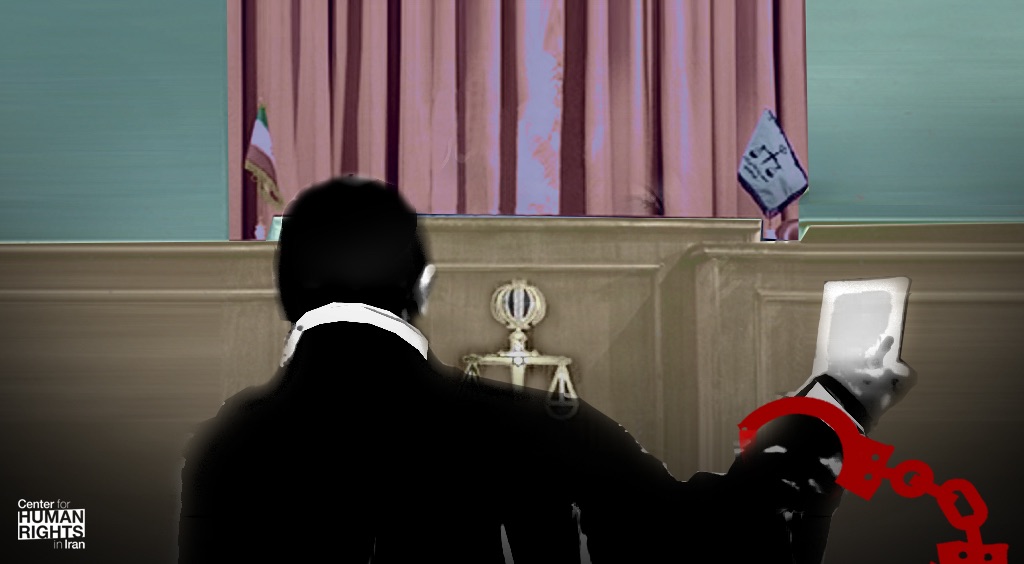
Mohammad Najafi is the Seventh Attorney to Be Sent to Prison in Last Six Months, Six Remain Behind Bars
October 30, 2018—Iran’s sentencing of attorney Mohammad Najafi to three years in prison and 74 lashes for “disturbing the state” and “publishing falsehoods” after he advocated for a young client who died under suspicious circumstances in an Iranian detention center is a flagrant violation of the right to counsel and a continuation of the unlawful assault on the legal profession in Iran that has left a half dozen attorneys behind bars for doing their job.
- The Center for Human Rights in Iran (CHRI) calls upon the Iranian authorities to immediately annul this sentence and release Mohammad Najafi.
- CHRI further calls upon the authorities to end their unlawful assault on the independence of the legal profession in Iran and release the other lawyers who have also been imprisoned for doing their job, including:
- Hoda Amid
- Arash Keykhosravi
- Ghasem Sholeh Sa’di
- Abdolfattah Soltani
- Nasrin Sotoudeh
- Payam Derafshan(currently out on bail)
- Farrokh Forouzan(currently out on bail)
- CHRI urges the international community, in all its interactions with the Islamic Republic, to directly and forcefully raise the issue of the unacceptability of the prosecution and imprisonment of attorneys for the defense of their clients.
“The authorities now control not only the investigators, the prosecutors and the judges—they also want to control the lawyers; they are effectively trying to strip Iranians of the right to self-defense,” said Hadi Ghaemi, CHRI executive director.
In January 2018, attorney Mohammad Najafi told media outlets that the authorities were trying to cover up the cause of the suspicious death of Vahid Heydari, 22, who died in detention at the 12th Police Station in Arak sometime between the end of December 2017 and the beginning of January 2018 by claiming he had committed suicide. Iranian authorities have claimed at least two other detainees “committed suicide” in custody in 2018: Iranian-Canadian environmentalist Kavous Seyed-Emami and Sina Ghanbari.
Iran’s State Prisons Organization and the judiciary are responsible for ensuring the safety and well being of all detainees held in state custody but no one has been held responsible for these deaths and their cause of death remains unknown. Instead, Iran’s judiciary has worked to silence those who have sought justice for the victims, including human rights lawyers.
Judge Ghasem Abdollahi of the Appeals Court in Markazi Province upheld the sentences for Najafi: One year and 74 lashes for ‘disturbing the state,’ and two years for ‘publishing falsehoods,’” Najafi wrote in a Facebook post on October 18, 2018.
The UN has declared flogging a cruel and inhumane punishment tantamount to torture. But over 100 flogging sentences were issued in Iran in 2017, with at least 50 implemented, according to the UN.
Najafi began his prison sentence in Arak’s Central Prison on October 28.
“I have been a lawyer and writer for years and during this time I have been repeatedly charged and acquitted,” said Najafi in May 2018. “The authorities themselves have told me that they are trying to grind me into oblivion.”
Najafi is the sixth lawyer currently behind bars for performing his legal work. Four of the other imprisoned attorneys—Hoda Amid, Nasrin Sotoudeh, Arash Keykhosravi and Ghasem Sholeh Sa’di—were all jailed over the spring and summer of 2018, and the fifth, Abdolfattah Soltani, has been imprisoned for seven years (since September 2011). Two other recently jailed attorneys—Payam Derafshan and Farrokh Forouzan were released on bail.
The lawyers have been imprisoned for trying to defend their clients, for defending political prisoners and for rejecting the state requirement that political detainees must only choose from a short list of state-approved lawyers for their defense.
According to the “Note to Article 48” of Iran’s Criminal Procedures Regulations, “In cases of crimes against internal or external security…during the investigation phase, the parties to the dispute are to select their attorneys from a list approved by the head of the judiciary.” In an interview on June 4, 2018, human rights attorney Nasrin Sotoudeh (who was not yet imprisoned) told CHRI that by approving only 20 lawyers in Tehran Province, the judiciary had disqualified 20,000 licensed lawyers and seriously undermined prisoners’ due process rights, including the right to counsel and a fair trial.
“Just imagine that a suspect has been charged by powerful military and security agencies and he goes in front of a judge in a court in Evin Prison under an intense climate of fear and intimidation and … his only hope is to have an independent and honorable lawyer to defend him but now, with the implementation of the Note to Article 48, that path has been closed and we have to say goodbye to the legal profession in Iran,” Sotoudeh said.
“Everywhere in the world, it is usually the lawyers who act as the guardians of the rights of suspects and society and freedom of expression,” she added. “Sharing information about a case is effective in that the judge will feel that his decisions are being watched by the public. But the judiciary’s action is going to cut the flow of information regarding political cases and make it easier to violate the rights of suspects and to interrogate, prosecute and sentence political and civil rights activists without information reaching the public.”
“Iran’s locking up and flogging of attorneys for trying to defend their clients is an outrageous violation of all international standards regarding the right to counsel,” said Ghaemi. “The international community should forcefully condemn this unlawful behavior and demand the release of these attorneys.”
